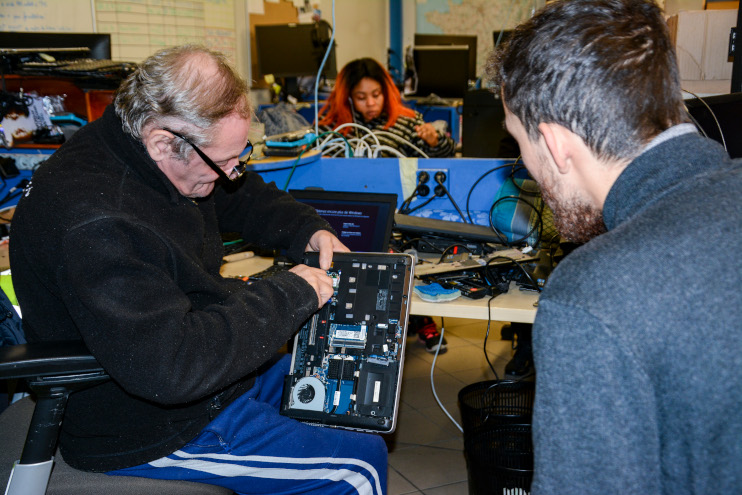Working and Learning Together: A Laboratory in Dignified Work

This article is published in connection with International Workers’ Day – May 1, 2023.
Working and Learning Together (WLT) is a cooperative with 23 employees in Noisy-le-Grand, France. It was founded by ATD Fourth World in 2002. It is just one of many Working and Learning Together pilot projects that ATD has started over the years.
WLT acknowledges that work isn’t everything. But the lack of recognition and sense of uselessness associated with not working or contributing to society can destroy lives. It is this knowledge that WLT is based on.
Defined together
Next to a large cold hangar, where hundreds of computers are stacked on pallets awaiting repair, Myriam Abadi and Antoine Lopez prepare lunch. They listen to music as they cook. Myriam and Antoine are employees of WLT and they volunteered to cook this week. After lunch with the other employees, they return to their jobs. Myriam dismantles laptops, while Antoine sorts computer waste. Jobs within WLT are defined collectively, with each employee giving their input and helping with this process. At WLT there are four departments, computer reconditioning, building renovation, outside maintenance, and office cleaning.
WLT also aims to inspire other pilot projects, such as Zero Long-Term Unemployment Zones, by sharing knowledge through a management training program. WLT is a “laboratory” in the way it operates, as its co-director Laurent Godin puts it. Convinced that no one is unemployable, WLT brings together “associate” employees, who have experienced exclusion and poverty, and “companion” employees, who are often from prestigious universities. All WLT employees, no matter their background, are seen as equal and as per policy can make no more than 1.5 times French minimum wage. But above all, everyone learns from each other and contributes to a respectful, humanised workplace.
Free speech
“At WLT, there is more humanity than in other companies” says Myriam. As a long-time restaurant worker she experienced “sadistic chefs, sexism and relentless pressure”, and she resents the lack of empathy in other jobs. “We can’t leave our problems at the door. If an employee has to deal with domestic violence or take care of sick relatives, this has an impact on their work. Managers have families, so how are they not affected by these issues? How [can] they not respond until an employee is exhausted, or not listen and adapt before it has an impact on business?” she wonders. For her, “the more management is united with ‘people from below,’ the more the company has a chance of success.”
“You only have to see how the employees say hello to the cleaners to know the mood in a company.”
They rebuild themselves”
Antoine, a companion employee of three and a half years, has seen “people damaged by work” come to WLT. But over time and at their own pace, they rebuild themselves, “without productivity hanging over them. Antoine describes how at WLT, their work “creates a social bond”: “if you are late or absent, there is no warning, no dismissal… For others it means leaving their home life behind for a time, and making themselves useful in society.” Working at WLT is “a salary and therefore housing” explains Cathy1, who has not always had “a roof over her head.” But it’s also “going out, celebrating birthdays, saying what you want without being afraid of getting fired, being accepted as you are,” she adds. (Employees receive an anonymous work environment survey every week. This allows everyone to freely give feedback.)
Salvatore Buonincontri started working in the restaurant business at the age of 13, and for many years would get up at 4 a.m.. But by the time he was fifty, he was unemployed. He came to WLT without a computer background; today, he is proud that he can “disassemble and reassemble a computer and train others.” “I may be earning a little less than before,” he acknowledges, “but there’s no pressure. If I have a problem, [WLT tries] to help me.” Roselyne, another WLT employee, describes all the odd jobs she has had over the years: as a maid, switchboard operator, home care assistant… But now, after working at WLT for nine years, she is happy to finally have “a stable job and a good work life balance.”
Be able to adapt
However, daily life isn’t always so simple for many at WLT. The educational and life paths of employees are extremely varied, and this can lead to significant differences in understanding. “Problems start with misunderstandings, so you have to release the anger you might feel. This sometimes means shouting, and losing time and energy. But once everyone learns to respect each other, we always end up finding solutions” explains Laurent Godin. You also have to “realise there are different ways to do things,” adds Antoine, and this is “worth experiencing”.
Despite these difficulties, WLT is doing well as a company. Each year, it sells between 800 and 1,000 refurbished computers. WLT also has contracts with local governments, businesses, and individuals. Little by little, WLT learns. As Laurent says, “we’re not looking to be a perfect business. We seek to be a company that continues to have exceptional adaptability. And, if we have this, it is because we don’t hold ourselves back.”
“We never tell ourselves that something is impossible… we try, and it always comes out positive.”
Article originally published in the Journal d’ATD Quart Monde.
Photo: Working and Learning Together, January 2023. © Carmen Martos

